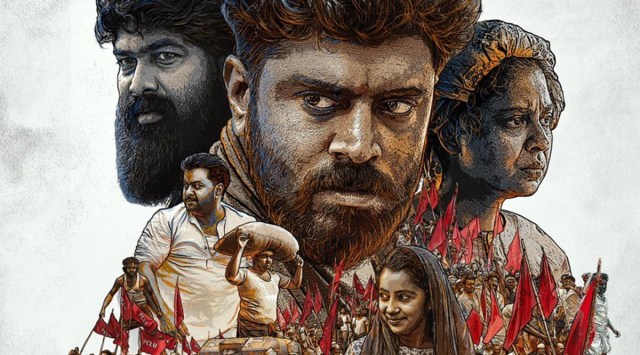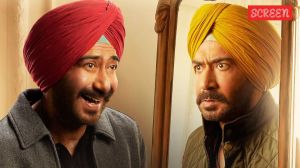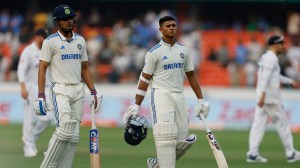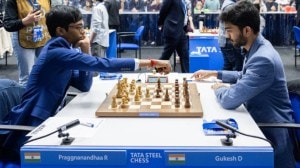Click here to follow Screen Digital on YouTube and stay updated with the latest from the world of cinema.
Thuramukham movie review: This Rajeev Ravi film is an epic we didn’t know we needed or deserved
Thuramukham review: Thuramukham is not just a film but also a documentation of the events leading up to the cold-blooded Mattanchery firing incident of 1953.
 Thuramukham has hit screens across India.
Thuramukham has hit screens across India. Are an eight-hour workday, job stability, and fair pay unreasonable demands? Well, they were in the 1950s Kochi. The port labourers of Mattanchery paid a price for making these demands and fighting for them; three workers died as a result, and many more “disappeared”.
Thuramukham (The Harbour), renowned cinematographer Rajeev Ravi’s fifth directorial venture, is not just a film but also a documentation of the events leading up to the cold-blooded Mattanchery firing incident of 1953. It is also a tribute to many different things, including the port city of Kochi, the labourers, their struggles, the protests that ensured they got what they deserve, and so on and so forth. Based on a play written by KM Chidambaran, Thuramukham is set in the 1950s and depicts the story of labourers living in Mattanchery who work at the harbour.
Thuramukham is unlike anything we have seen up to this point, despite the fact that it is fundamentally a historical drama and a political film to its core. Thuramukham is probably not for you if you prefer action-packed, dialogue-driven films in which an angry young man takes on the system by himself and overthrows the oppressors. Thuramukham, though, is unquestionably for you if you’re interested in learning how we, as a society, got to this point.
The first act of the movie provides a prelude to the main focal points. With their three children, Maimu (Joju George) and his wife (Poornima Indrajith) reside in Mattanchery. Like dozens of other labourer families, they reside in a slum close to the harbour. The film’s first act, which was beautifully captured in black and white, sheds light on the appalling conditions in which the employees live and the chappa system, which Srank (Senthil Krishna) claims treats workers like dogs. “It’s just like throwing food to stray dogs,” says Srank about the system in which the mooppen will throw copper coins towards labourers and only those who manage to catch them will be allotted work the next day. The others will have to suffer in silence. The director does an excellent job of illustrating how the chappa system triggers workers’ instincts for survival throughout the entire movie. They fight one another to grab the tokens which would provide them jobs that will in turn help them earn, though minimal, wages.
The movie then jumps to the early 1950s, when labour organisations are first getting started. After Maimu “disappeared”, Moidu (Nivin Pauly) and Hamza (Arjun Ashokan) are now the family’s primary earners. While Moidu is a reckless drunkard, Hamza is a realist who is concerned about how they would survive in a system that constantly oppresses them.
But, the focus of the movie never narrows to only Maimu’s family. There are countless other characters who also strive to make ends meet while having their lives touched by the unfair system.
Even when a new union, Cochi Thuramukha Thozhilali Union (CTTU), is founded, the situation of the labourers stays the same since the CTTU’s top brass refuses to abolish the chappa system and instead begins charging employees a “special” sum for allocating tokens. The Port Cargo Labor Union (PCLU), led by Santo Gopalan (Indrajith Sukumaran), then enters the scene and begins voicing grievances on behalf of the workers.
But the aristocrats and bourgeois are so shrewd that they start causing strife among the working class. They start off by removing those who continue to oppose them while turning a few into their henchmen by giving them alcohol and a free pass to do whatever they choose. Notable is also how the film demonstrates how institutions like the police serve as tools for the wealthy.
The manner in which the protests are filmed by director-cum-cinematographer Rajeev Ravi is one of the movie’s main draws. Each has a significant message to convey, from the minor ones to the massive one in the climax. These scenes effectively convey the workers’ anxiety about their financial security and their determination to fight together despite all obstacles. The slogans that the workers shout are equally significant because they demonstrate their unwavering willpower to fight for what is rightfully theirs.
Latest reviews: Tu Jhoothi Main Makkaar | MH370 The Plane That Disappeared | 65 | Tar
The actors, from Nivin Pauly, Poornima Indrajith, Arjun Ashokan and Nimisha Sajayan to Indrajith Sukumaran, Joju George, Sudev Nair, Darshana Rajendran and Manikandan R Achari and even those who did supporting roles, manage to convey the story’s ethos. Pauly’s portrayal of the rugged and ruthless Moidu underlines how good an actor he is. Thuramukham’s women stand out. The film does a beautiful job of illuminating women’s life since, in any society, they end up bearing the brunt of what men do.
Thuramukham moves along at the distinctive Rajeev Ravi speed, despite numerous opportunities for commercialisation by adding an extra fight or song. The movie gives off the impression that it is a story of everyone and that there are no background characters. It masterfully builds to its terrifying finale, which depicts the actual Mattanchery firing incident, which claimed the lives of three labourers and, according to the makers, the “disappearance” of numerous others.
The film’s epic quality is a result of Rajeev Ravi’s meticulous attention to detail and majestic cinematography, as well as the excellent work of the art department under the direction of Gokuldas, Radhakrishnan S’ sound design, and background score by “K”. The stunts, choreographed by Mafia Sasi, Prabhu, and Dinesh Subbarayan, also merit special mention because they never exceeded their bounds and interfered with the pace of the movie.
Although two of Rajeev Ravi’s previous films as a director, Annayum Rasoolum and Kammatipaadam, were both almost three hours long, Thuramukham’s running time of 174 minutes seems a little excessive because a few scenes fail to hold viewers’ attention for very long and a few minutes of trimming here and there could have improved the viewing experience. But for those who enjoy the slow pace, this movie is unquestionably a gem.
For Malayalam cinema viewers who grew up watching supposed political films like Lal Salaam (1990), Rakthasakshikal Sindabad (1998), and Sandesam (1991), which instead centre on the lives of certain fictional characters than on real-world socio-political situations, Thuramukham is a masterclass on how a political film should be.
Workers of the world, unite! – If one wishes to tell their friends what Thuramukham is about, this is it…
Photos
- 01
- 02
- 03
- 04
- 05


































